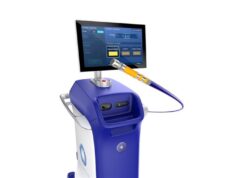
The ARTISAN atrial fibrillation trial is a prospective, single-arm, multicentre, US and OUS study designed to evaluate the safety and effectiveness of the Sensei robotic system and Artisan family of catheters for introducing and positioning specified commercially available radiofrequency ablation catheters in patients with symptomatic, drug-refractory paroxysmal atrial fibrillation.
The Bayesian-designed study requires enrolment of an initial cohort of 125 patients, with subsequent enrolment permitted to support the end-point analysis. The trial has two primary endpoints: safety, defined as the absence of early onset of all major adverse events, and efficacy, defined as freedom from atrial fibrillation through one year.
“This patient cohort sets the initial timing to evaluate the trial endpoints and gain additional clinical indications in the USA,” says Cary Vance, president and chief executive officer of Hansen Medical. “We believe our robotic technology brings enhanced control and predictability to these procedures, and addresses serious occupational hazards faced by physicians and their teams in the delivery of patient care.”
“This clinical trial is significant and sets a milestone for robotic technology in the treatment of patients with atrial fibrillation,” says Joseph Gallinghouse, Texas Cardiac Arrhythmia Institute at St David’s Medical Center. “The team here at St David’s finds that the Sensei system reduces radiation exposure to the operator, while the Artisan catheter predictably navigates and provides a stable platform during atrial fibrillation ablation, a procedure which can sometimes last for hours.” Gallinghouse has significant experience with the Sensei system and Artisan catheter and has performed more than 1,200 procedures to date.









